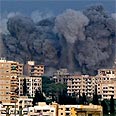
Smoke billowing over B=eirut after Israeli raid
צילום: רויטרס
End it now
The government is conducting this war with no peripheral vision
When a lone Qassam fell on the grounds of an Ashkelon school that was closed for summer vacation and caused some damage to the building, Prime Minister Olmert called the attack a "declaration of war." One wonders whether he was just being loose with his tongue or whether he really forgot the meaning of the word.
Since then, he has since gotten a very clear reminder: You think that's war? We'll show you what war is!
Analysts looking for the answer to how we got here ought to recall the initial demand from the Palestinian militias for the release of female prisoners and children in exchange for Gilad Shalit. In our rush not to negotiate with terrorists (never mind that we have done so in the past and will inevitably end up doing so again this time) no one bothered to consider how it came to be that hundreds of Palestinian women and children are languishing in Israeli jails.
Those who can't understand why the Palestinians haven't given up the struggle in the wake of Israel's withdrawal from Gaza might be surprised to learn that they don't share the distinction Israel draws between Gaza and the West Bank, and suffer daily reminders that the demolition of Gush Katif did not leave them a free people in their own land.
On Monday, the commander of the IDF Judea and Samaria Division said that terrorist organizations in the West Bank are attempting to open another front. Wrong! As far as the Palestinians are concerned, it is all one front.
Ever-more force
In November 2000, opposition leader Ariel Sharon addressed some 100,000 demonstrators who had gathered in Jerusalem's Zion Square under the banner "Let the IDF win." The IDF had not exercised its full potential in confronting the intifada, Sharon told the assembled crowd, and his promise to end the policy of military restraint helped win him the premiership a few months later.
Almost six years later and with no end to the fighting in sight, Olmert is still trying to sell the idea that there is a measure of force that has not yet been used but which, when unleashed, will deal what the prime minister called the "winning blow."
More force, he is telling us, will succeed where mere force failed. We must restore the Israel's deterrent power, he is saying, as if the IDF's military superiority has ever been in question and as if it stopped the stones of the first intifada from evolving into explosive belts and rockets.
Psychological warfare
Whether Hasan Nasrallah gave the order to attack Israel's northern border and take IDF soldiers prisoner because he wanted to come to the aid of the Palestinians, win the release of Sami Kuntar after almost 30 years in captivity, 'liberate' the Sheba Farms farms, or simply strike a blow at the Zionist enemy, Israel certainly had a right to respond.
But as the saying goes, it is better to be smart than right, and the government has been anything but smart from day one. It is proceeding militarily as it did diplomatically prior to this latest outbreak – with no peripheral vision.
Both Olmert and Defense Minister Peretz keep praising the public's stamina, with the not-so-hidden message being that to voice opposition is to play into the hands of the enemy. This glorification of consensus and de-legitimization of political or popular protest poses a greater threat to Israel than the missiles being fired from the north.
By making our ability to suffer in silence a test of our loyalty and bravado, the government is engaging in psychological warfare against its own citizens. The recent Dahaf poll that found that over 80% of the public supports continued military action might create the impression that this approach is working, but its success will be short-lived. The Israeli public's tolerance for military and civilian casualties is limited, and this is to our credit. It is not a sign of weakness; it is a sign of our humanity.
End it now
Yesterday Prime Minister Olmert told the nation that he is doing everything possible to bring the kidnapped soldiers home, but after meeting with a UN delegation today, his foreign minister hurried to dispel any notion that the opening of a diplomatic front would bring the military operation to a halt. Apparently the government is willing to do everything... except cease its fire.
The chief of staff himself said that in the end it is not the army but the statesmen who will finish the job; the question is when. With hundreds of Palestinians and Lebanese – many of them civilians – killed in just a few short weeks, one might argue that we have already proven that we know how to wage war; now, for the sake of their children and ours, it is time to show that we know how to end it.
Susie Becher is a member of the Meretz-Yachad National Executive










